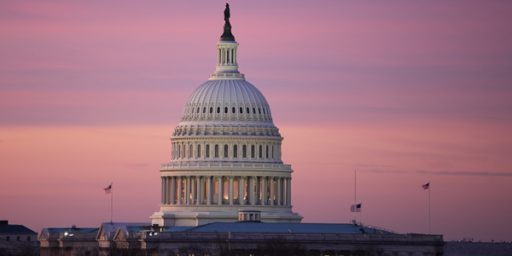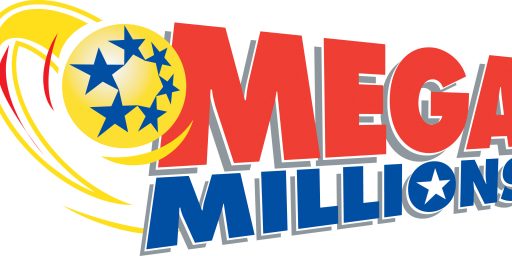Go Vote, Win $1 Million
A group in Arizona wants to give everyone a chance to win $1 million—but only if they vote:
There’s going to be a new reason for Arizonans to go to the polls this year: They could win $1 million.
The Secretary of State’s Office certified Thursday that backers of the voter lottery plan had submitted more than enough signatures to qualify for the November ballot.
But the measure is worded in a way to actually encourage people to vote both in the primary this September as well as two months later when the actual initiative will be on the ballot. If it is approved in November, it will be retroactive: One lucky person who voted in this year’s primary and another who cast a ballot in the general election each will get $1 million.
In fact, it’s even set up so that there could be multiple winners. Mark Osterloh, who came up with the plan, said businesses are free to make donations of cash, or maybe even a new car, to encourage turnout.
The crux of the debate is not about the morality of the plan, but whether or not it creates enough of an incentive for voters to study up on the issues:
Osterloh said he believes that providing a carrot for would-be voters would increase participation in the democratic process. The Tucson physician dismissed concerns that the kind of people who would vote solely for a chance to win the lottery are likely to be ill-informed about the candidates and the issues.
“Once they decide they’re going to vote, they will study the issues and candidates,” he said. “And they will vote in their own enlightened self-interest.”
Not everyone is convinced that will occur.
Attorney General Terry Goddard said there’s an expectation that those who vote now at least review the issues, even if it’s just the day before they vote.
“The implication, at least, of a lottery contestant is they would not study at all,” he said. “That troubles me.”
The idea also bothered elected officials in some counties who are in charge of registering voters and, by extension, encouraging participation.
“We’re in this great country of ours, and now we have to give incentives to get people to vote?” asked Pima County Recorder F. Ann Rodriguez. “I think people need to reflect on what kind of society we are becoming.”
Both Steven Jens and Glenn Reynolds agree with election officials who believe that this will encourage “stupid people” to vote; quoth Jens: “Not only do they want to provide an incentive for uninformed people to vote, but it’s only a significant incentive for people who either can’t estimate expected values or are risk-seeking.”
To address the incentive issue first: this has been at the heart of a debate in political science for the past fifty years, dating back to Downs’ An Economic Theory of Democracy. Basically, in “modern” post-reform democracies like the United States, the material incentives for voting are essentially nil, due to the end of the spoils system (there are exceptions in America, primarily in urban politics, and of course vote-buying remains rampant in the developing world). The basic conclusion: if people are rational, they won’t vote.
That any democracy (with the exception of those where voting is either mandatory or “shamed”) has non-negligible numbers of voters turn out at the polls is largely due to party propaganda, which exaggerates the differences between the likely outcomes of elections (in both economic and non-economic terms), mobilization efforts by said parties, and the inculcation of civic norms. On the face of it, a monetary incentive to vote (the expected value of this one for the average Arizonan would be about 50¢; in other terms, about 10 minutes’ labor at minimum wage, which might account for the amount of time it takes to vote in an election) probably wouldn’t make that much difference either way, although it might motivate more political independents to vote, since they are rarely targeted by get-out-the-vote drives.
Which gets us to the “stupid people” question. In large part, the parties (particularly Democrats) already mobilize large populations that don’t pay much attention to the issues, but can be counted on to vote the party line. Visit any inner-city neighborhood or retirement community on Election Day, and you’ll see swarms of party workers trying to drum up as much turnout as possible—and they’re not particularly worried about how “educated on the issues” these potential voters are, so long as they go and vote for their party’s candidates.
The reality of the issue is that even most voters (much less citizens) are woefully uninformed, lacking either the capacity to understand political information or the motivation to acquire it in the first place—perhaps both. But voting isn’t all that hard—all it really requires is some vague sense that (party, candidate, or issue position) A is “better” than the other alternatives on offer, however you choose to define “better.” Rocket science it is not.
My suspicion is that Osterloh and the other proponents of this lottery may be onto something, albeit indirectly, because people are more likely to acquire information if they think they will use it, and the “voting lottery” might be enough of an incentive in the back of the voter’s head (in psychological terms, a “priming” effect) to tip him or her into watching a few minutes of a debate, listen to Hannity and/or Colmes, pay a little more attention to Jon Stewart’s jokes, or read another paragraph of an article in the newspaper. All it takes is one little piece of information to make a decision—just give the voter the incentive to do so and he or she will.





Good post; I am reconsidering my kneejerk opposition to this idea.
(Though your notion that “particularly Democrats” mobilize an unreflecting electorate seems questionable. –Gotta criticize something, man–this is the Internet!)
I wonder how many will walk in and just ask for the quick pick.
I thought you were a political scientist! Please provide some attribution for the party difference other than a hypothetical “visit to any inner city neighborhood.” Anyone with any understanding of the mobilization literature in American politics would know that locality, the type of election, district party makeup, issue convergence, the presence of an incumbent and a whole host of other factors influence mobilization.
You might want to take a look at anything by Huckfeldt and Sprague for some informed analysis.
All it takes is one little piece of information to make a decision…
And that piece of “information” will be nothing more than knowing where your poll is and how to make sure your vote is included in the drawing.
And, to use your “stupid people” example, what makes you think that they will suddenly become more informed when a prize is offered for voting when they are not “educating themselves on the issues” as it stands now?
In one of my every other week lunch discussions with a spectrum of political views (Liberal, libertarian, moderate who thinks a divided government does the least harm, social conservative and me) we found surprise agreement on the idea of requiring a test for eligibility to vote. We recognized the issues with ‘literacy tests’ in the past, but surprisingly all agreed that an informed voter was a boon to our country. The liberal because in his mind anyone who is informed on the issues surely couldn’t support the GOP. We booted around a few ideas, but got no where fast on agreeing what the test should be like. It was obvious that each side was wanting to skew the test to favor ‘their’ side.
Then the moderate popped up with an idea. Why not double the number of names on the ballot for each office. Random names would be inserted, with a party identification for the parties competing. The election office would generate random names equal to three times the number running. Each candidate could identify their top choices (ranking them 1,2,3 etc) and veto one name. The top choice names selected by the candidates would then have party affiliation randomly assigned to them.
Now when a voter gos into vote, they can vote for whomever they want. But if they select any “fake” candidate, their vote is discarded. If they at least know the names of the people running, then their vote counts.
Add that to the lottery idea and you might have a winner. The ‘stupid’ voter gets tripped up and his vote doesn’t count. The voters smart enough to know the name of the candidate they want gets his vote counted and the chance to win the money. Everybody is happy.
Bhoe (and, to an extent, Anderson): I mentioned inner-city neighborhoods (and retirement communities) as examples–growing up in Florida, obviously both parties targeted the latter, depending on the region (and, in the case of Miami, the former as well). Democrats historically have done a better job of doing “visible” GoTV efforts like neighborhood canvassing than the Republicans, hence the phrase “particularly Democrats.” And both populations tend to be relatively strong in partisanship and easier to mobilize.
Bhoe, I didn’t mean anything pejorative by it, but clearly you were searching for something to piss you off. Grow up.
YAJ: An intruguing concept, but I don’t agree with the premise that uninformed votes should be discarded.
Incidentally, in Britain up until the mid-1960s, candidates weren’t identified by party on the ballot; turnout noticeably increased once party labels were added (but name recognition of candidates went down). For Bhoe: that’s in Cain, Fiorina, and Ferejohn’s The Personal Vote; no page cite, since that was 8 years ago in my Congress seminar, I’m not an institutions guy, and (hence) I don’t have a copy of the book.
Mark: I’m not saying this will magically happen for everyone. But, in general, it is known that people will acquire and retain more information if they have a “task” associated with it than if they don’t–this applies to everything, not just politics.
So, by getting people more motivated to vote, they are more likely to pay attention, because now they have a reason to. As it stands, the only people who pay attention to politics are the sickos who either (a) have to know about politics for their jobs or (b) have no other hobbies. Everyone else gets it by osmosis (the information is unavoidable, so you have no choice but to acquire it) and/or the task (I have to vote, therefore I’d better get some information).
For Bhoe: just read some cognitive psych literature. Or Alvarez and Brehm. Or Aldrich, Rahn, Borgida, and Sullivan. Or maybe some Krosnick; I really don’t care. I’m not playing this stupid game any more with someone hiding behind a pseudonym.
So, by getting people more motivated to vote, they are more likely to pay attention, because now they have a reason to.
A potential problem is that people have little if any more incentive to make their decision on any rational basis. The lottery-minded voter *could* start watching Fox or CNN, or studying recent issues of Foreign Affairs.
Or he could just decide “Kerry’s a windsurfing rich boy,” or “Bush talks funny,” and let it ride on that. Indeed, readers of the NYT (former) and Slate (latter) might well decide on that basis.
OUTRAGEOUS!!
Why must we measure democracy’s success by voter turnout? Why should the government even make it it’s business to increase turnout? These are fundamental questions that should be answered before wild schemes such as this are implemented.
It would seem content citizens would not feel like voting since things are going okay for them while unhappy voters would flock to the polls to make a change. A certain equilibrium would be reached eventually and turnout would be exactly where it should be without any intervention by a governmental body.
This idea, along with many others, is misguided. Turnout is not anything to worry about.
My primary concern is whether there are mechanisms to stop voter fraud, since there is now a perceived potential monetary gain for voting. The fiasco of the 2004 election in Washington State, where many more fraudulent votes have been determined than the Governor’s election was won by, is an example of voter roll problems. Likewise the same-day voter registration procedures in Wisconsin, where many fake addresses were found (Milwaukie) in 2004, could lead to a “vote early, vote often” situation.
In the case of Arizona, I can see some “snowbirds” deciding to register in AZ, and also keep voting at their real primary summer residence.
Why must we measure democracyâ??s success by voter turnout?
Very good point. People who self-select not to vote, probably shouldn’t be voting.
The solution proposed by the article mistakes a symptom for the disease.
–Okay, I seem to be back to my kneejerk position!